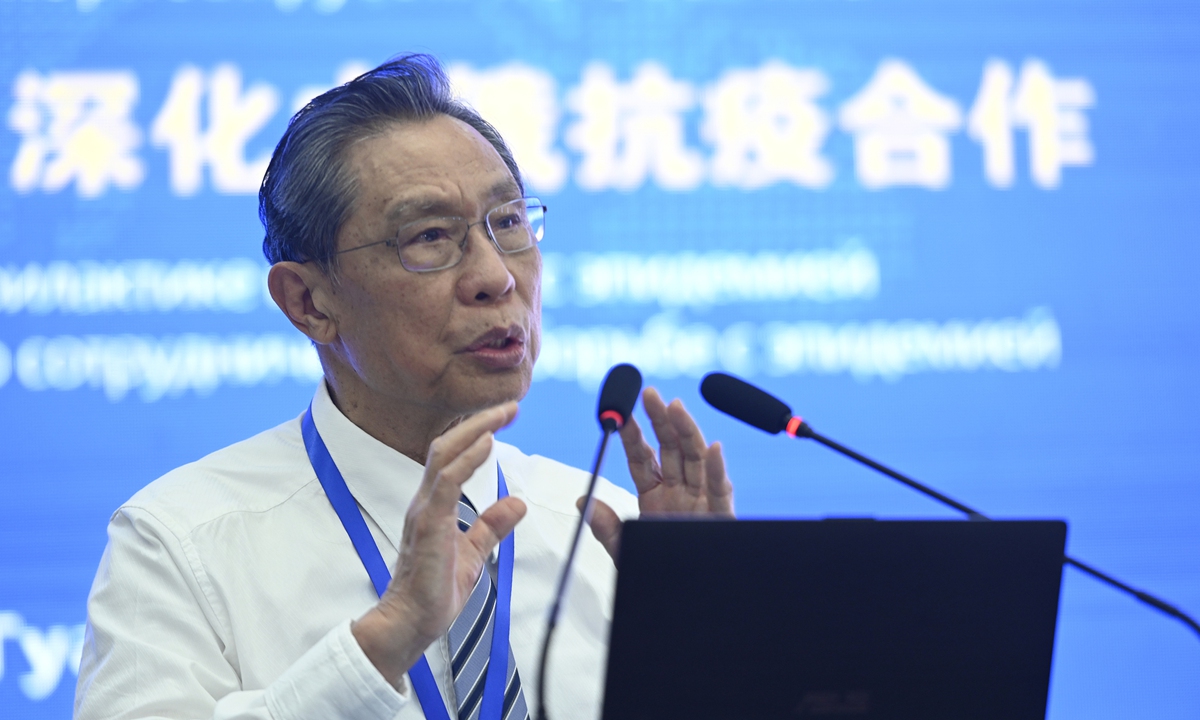
Zhong Nanshan File Photo:VCG
China's top respiratory expert Zhong Nanshan said that China has adopted a right path since the COVID-19 outbreak by making an all-out effort to curb the spread of the virus, and prevention-centered strategy will continue to dominate while the specific policies may change when the effective vaccination rate is high enough.
Zhong made the remarks in a latest interview with Southern People Weekly that was reported on Sunday.
Zhong believed the criterion for China to generally relax border control is 80 to 85 percent overall vaccinated. He noted that after effective vaccination, most people would show no or mild symptoms if infected.
Vaccination also effectively drops fatality rate of the disease, which is 1-2 percent worldwide, dozens of times of flu. When fatality rate is low enough, absolute most people who get COVID-19 will recover rather than one or two in every hundred could die, Zhong said.
Zhong estimated the COVID-19 will slowly go through the process of dropping fatality rate and low infection rate, and low fatality rate and high vaccination rate is the threshold for opening up.
China's vaccination rate will reach 80 percent by year's end, and the question to be address is how to maintain an effective protection rate which naturally declines after half a year. "That is what we are doing now -- to develop more vaccines and to research on how to boost immunity," Zhong said.
Zhong noted China's COVID-19 control reflected the principle of "healthy China" that is achieved not via treatment but by prevention. It is also in line with traditional Chinese medicine's philosophy -- the best doctor solves problems before one becomes ill.
There is no effective treatment for COVID-19 so far, and the most important form of suppression is still to curb the infection, which leads to community-level control measures, face mask requirements and strict quarantine when cases emerge, Zhong said, noting the massive vaccination is also part of the prevention-dominant strategy.
Amid Western suspicions on efficacy of China's tight control measures, Zhong pointed out that since vaccination rate hasn't reached 80 percent, those traditional control policies have proved the most effective, citing handling of a case resurgence in Guangzhou and Fujian as examples.
Delta-related resurgence in populous Guangzhou, capital city of South China's Guangdong resulted in 190 cases across the province despite of the much strong infectivity of the variant. Some countries that eased control measures too early instead saw sharp increase in cases during the Delta's dominance.
China has invested lots of funding, manpower and resources to keep current tight control policies, which "won't be forever." Since the virus is changing, China's strategy is changing, too.
Zhong also pointed out that Israel's resurgence despite of a high vaccination rate is caused by its disproportionate vaccination of younger people. They have noticed the challenges and taken actions accordingly, which brought the epidemic under control again.
In the interview, Zhong also noted the importance of origins-tracing for epidemic control. SARS was quickly curbed the following year when its interim host was identified and cut contact with humans, but the origins-tracing work for SARS-CoV-2 was politicized by some countries.
The World Health Organization has coordinated an investigations in China with the consideration of Wuhan Institute of Virology, but political manipulation remains an issue, Zhong said, urging joint efforts on tracing the origins of the virus .
China has strong will to cooperate on the topic, but "as long as virus origins-tracing is politicized, a conclusion is preconceived, cooperation is impossible."
Zhong noted there is cooperation on epidemic control policies and vaccine studies, such as his team's biweekly communications with the medical school at Harvard University, but those are not enough.
Global Times




